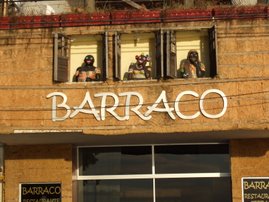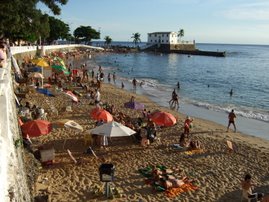one of the first things you hear about when you come to brazil is the persistence of the myth of racial democracy. this is a concept that has defined the country since last century and who’s architect was the social scientist and author Gilberto Freyre. In the 1930's, Freyre introduced the idea of a "Brazilian racial democracy", in where he argued that the mixture of races here (African, Indian, European) has created a race-free society where races freely mix socially and sexually and thus racism doesn’t exist .He said that class difference in Brazil were based on economic disparities, and not racial differences. This narrative has obviously served the interest of the white elite here and not the mass of black folks of which, a large part are poor, live in the favelas or moros on the outskirts of town outside of the economy and who have little access to education and upward mobility. This narrative has also inspired much debate- and yesterday I took part or rather witnessed one among 3 brilliant, politically progressive, women- one afro-Brazilian, one American white and one mixed but considers herself black (race here is very complex. This was crystallized for me recently when someone pointed out that Brazilians have about 30 words for various shades of brown and black. A person is largely defined by what they want to call themselves. So, there are people who are as dark as me, who call themselves ‘morena’–which means brown; brown people who call themselves branco, and so far ive met exactly one brown person who calls herself black). The four of us were eating a late lunch, which after many beers, turned into an evening, which turned into a night. And they were kind enough to speak a hybrid of Portuguese and English so I could follow the discussion. It basically was about whether Freyre could be considered anything but racist since in his effort to elevate the African contribution to Brazil, he stereotypes blacks and argues that slavery wasn’t that bad here. The Afro-Brazilian woman argued no – he cant be. The other Brazilian woman though agreeing that Freye was problematic argued that he had to be read in the context of his time. What was interesting to me is that a white dude who wrote in the 1930s was still the defining voice about race in this country – you either argue for or against him but he is still the standard. I don’t know exactly what that says but I feel like it says something. Then of course we moved on to bigger and better subjects like gay celebrities, differences between butch and femme here and in the states and dirty Portuguese words.
This was the second impassioned discussion I had witnessed/taken part in this week. Earlier in the week, I went to get my toenails done (one of the most convenient things to do in this town because there is literally a salao de beleza on every block). And when I told the woman my name she repeated it to make sure she understood. I am now used to this– most people here know that my name is a language and is in fact the language of the afro-brazilian religion of candomble – so they repeat it, or ask again to make sure they heard me correctly. Sometimes they tell the person next to them and its usually it’s a nice way to break the ice (however, on the bus recently I was talking to this man and after I told him my name he stopped and looked at me in shock said ‘you must change your name’). So after I told the woman at the nail place she told me she knew some Yoruba words because her mother practices candomble and she grew up in the religion. Then one of her colleagues asked her if it is a religion where they do bad things. This sparked a whole discussion and since it was all in Portuguese, most of it escaped me but basically the woman was explaining it was a religion brought over by the slaves and that it was a very beautiful religion, very spiritual and was not about doing harm to people. Interestingly when I asked her if she practices candomble, she said though she likes to go to the festas da candomble and especially liked the food there, she herself preferred Catholicism.
Salvador is awash in conferences this time of year. last week was a conference on Africa and development at the university. I saw 2 good documentaries about Angola and Zimbabwe. and this upcoming week is the Caribbean Studies Conference where people from around the world are presenting on everything under the sun - at least under the caribbean sun. im hoping i can pass as an academic and get into some of the talks.
Subscribe to:
Post Comments (Atom)


No comments:
Post a Comment